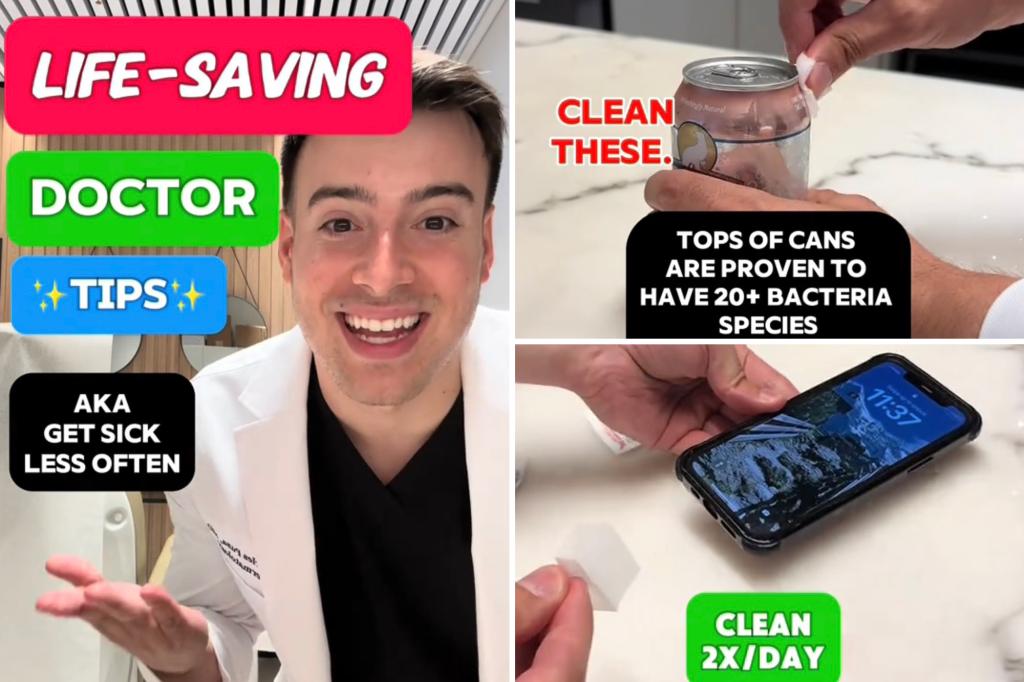NYC board-certified dermatologist Charles Puza, known for his studies at Harvard and Duke universities, has shared four anti-germ hacks that have gone viral. These tips are aimed at helping people stay healthy and avoid getting sick. Puza recommends wiping the top of aluminum cans before drinking from them, as they tend to be contaminated with bacteria and mold. He suggests cleaning them with tap water and a dry tissue to reduce the risk of infection. Additionally, Puza advises against using lemon wedges in drinks at restaurants, as lemons are known to be among the dirtiest items in the kitchen, often harboring microbial growth.
Puza also emphasizes the importance of not touching door handles, which are often covered in bacteria. He recommends using tools that attach to a keychain to open public door handles and press elevator buttons without direct contact. At home, it is essential to regularly wash door handles with dish soap and warm water to reduce the spread of germs. Another important tip from Puza is to disinfect your phone regularly, as it can harbor a lot of germs due to being taken everywhere, including the bathroom. He advises using antibacterial wipes or alcohol-based disinfectant cleaners containing 70% isopropyl to clean the phone’s surface at least twice a day.
According to research published in the Journal of Microbiology and Molecular Genetics, beverage cans can be a potential source of infection for consumers due to the handling of different people in various environments. The study found that rinsing the top of aluminum cans with tap water and wiping them with a dry tissue was the most effective way to remove bacteria and mold from the lids. This highlights the importance of being mindful of potential sources of infection in everyday items we come in contact with. By following Puza’s advice of cleaning the tops of cans before drinking from them, individuals can reduce their risk of getting sick.
Using lemon wedges in drinks at restaurants may seem like a refreshing addition, but it can actually introduce harmful microorganisms into your drink. A 2007 study found that nearly 70% of lemon wedges served with water or soda at restaurants contained microbial growth. This is due to how lemons are handled, cut, and stored before being served to customers. These contaminated lemon slices can then transfer bacteria to the drink and the rim of the glass, posing a potential health risk to consumers. Puza advises against using lemon wedges in drinks to mitigate the risk of exposure to harmful microorganisms that may be present on these citrus fruits.
Door handles in high-traffic areas are often teeming with bacteria and viruses, making them a considerable source of potential infection. Puza recommends avoiding touching door handles whenever possible, especially in public places. There are tools available that can be attached to a keychain to help open doors and press buttons without direct contact. Additionally, it is crucial to regularly clean and disinfect door handles at home with dish soap and warm water to prevent the transmission of germs. By following these simple practices, individuals can minimize their exposure to harmful pathogens and reduce the risk of getting sick from commonly touched surfaces like door handles.
In conclusion, by following these anti-germ tips shared by dermatologist Charles Puza, individuals can take proactive steps to stay healthy and avoid getting sick. From cleaning the tops of aluminum cans before drinking from them to avoiding using lemon wedges in drinks and disinfecting commonly touched surfaces like door handles and cell phones, these simple habits can make a significant difference in reducing the spread of germs and protecting one’s health. By incorporating these practices into their daily routines, people can better protect themselves from potential sources of infection in their environment.


